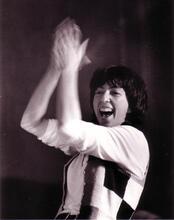Sarah Silverman
Comedian Sarah Silverman at the 2007 Tribeca Film Festival.
Courtesy of Joan Garvin
Sarah Silverman is an American stand-up comedian, writer, and actor known for her sharp, detached stage persona and boundary-pushing material that often deals with themes of Jewish identity. Her major works include the specials Jesus Is Magic, We Are Miracles, and A Speck of Dust, and the television shows The Sarah Silverman Program and I Love You, America. Silverman has also appeared in feature films, viral videos, and documentaries. She helped usher in the era of “alternative” comedy in the early 2000s, and her style combines caustic, often raunchy social commentary with a disarming smile.
Introduction
Sarah Silverman is a stand-up comedian, actor, and writer known for her often controversial and politically incorrect material. Her work addresses subjects like race, sexuality, and politics, as well as Jewish identity and the Holocaust. Cultural critics have compared her to Lenny Bruce and Sandra Bernhard. Her routines rely on a combination of vulgar language, social commentary, and childlike silliness. Of her material, Silverman has stated, “I either say what I think, or the opposite of what I think. And hopefully the absolute power of both transcends” (Itzkoff).
Family and Early Years
Silverman was born to a middle-class Jewish family of Russian and Polish ancestry. The youngest of four daughters, she was raised in the mostly Catholic town of Manchester, New Hampshire, and attended the Derryfield School. “We grew up in a place with very few Jews. I didn’t look like the other kids. I had hairy legs, hairy arms, hair everywhere. I looked like a little monkey,” she explained in an interview (Solomon).
Silverman’s mother, Beth Ann, was a photographer and the founder of a theater company, where she produced and directed plays. Her father, Donald, sold discount clothing and furniture. Donald and Beth divorced when Silverman was six years old. During her childhood, Silverman describes feeling like an outsider, and she struggled with bedwetting, depression, and anxiety. In her memoir, she wrote that her “early trauma was a gift, it turned out, in a vocation where your best headspace is feeling that you have nothing to lose” (Silverman).
Silverman’s older sisters include Susan, a feminist Reform rabbi now living in Jerusalem, Laura, an actor, and Jodyne, a screenwriter.
Early Career
Silverman first performed comedy as a teenager at the club “Stiches” in Boston. She started college at New York University but left in 1993 to pursue stand-up, telling sex jokes at open mic nights around Greenwich Village. At twenty-two years old, she was brought on as a writer for Saturday Night Live. However, most of her ideas were rejected as too edgy; none of her sketches made it on the air and she was eventually let go.
Over the next several years, Silverman appeared on television programs like Mr. Show, The Larry Sanders Show, and Seinfeld. She voiced Hadassah Guberman, a Jewish American Princess character, on the comedy puppet program Crank Yankers. Silverman also took small film roles in There’s Something About Mary, School of Rock, Bulworth, and other movies, playing both serious and comedic parts. She filmed a concert film, Jesus is Magic, for HBO in 2005 after performing it on stage in New York City and Los Angeles. It included a combination of wry, ironic stand-up routines, songs, and sketch vignettes. The contrast between Silverman’s “potty mouth” and her “schoolgirl” looks drew media attention, along with her willingness to explore difficult, taboo topics such as death, sexual violence, and terrorism.
Later Career
Clip from comedian Sarah Silverman’s “Sarah Silverman: A Speck of Dust.”
From 2007 to 2010, Silverman produced The Sarah Silverman Program, an offbeat single-camera sitcom in which she played a more arrogant and oblivious version of herself, or as the Village Voice put it, “an indulgent, whiny rapscallion…the uber-bitch of our darkest dreams” (Musto). The series ran for three seasons. Silverman was nominated for an Emmy Award for Outstanding Lead Actress, and the show was nominated for a GLAAD Media Award for its portrayal of gay and lesbian characters.
In 2010 Silverman published a humorous memoir, The Bedwetter: Stories of Redemption, Courage, and Pee, which shared how she developed her rebellious comedic perspective. Over the next few years, she appeared in the films Take This Waltz, Wreck-It Ralph, and I Smile Back, as well as several documentaries about comedy, Holocaust humor, and mental health. Her 2013 HBO special We Are Miracles won an Emmy Award for Outstanding Writing for a Variety Special. In 2017, she recorded A Speck of Dust for Netflix, which was nominated for a Grammy for Best Comedy Album. Her 2017-2018 Hulu talk show I Love You, America grappled with the cultural and political atmosphere of the Trump era. It included confessional monologues and interviews with guests, as well as scenes in which Silverman visited conservative families and organizations across the country, to “get at the symptoms of why we are where we are” (Magary).
In 2020, Silverman began recording The Sarah Silverman Podcast for YouTube.
Controversies
In 2001, Silverman told a joke on Late Night with Conan O’Brien that contained an anti-Asian slur, which was condemned by Guy Aoki of the Media Action Network for Asian Americans. She has also been criticized for wearing blackface on an episode of The Sarah Silverman Program. In the episode, her character sought to determine whether Jews or African Americans had it worse, and blackface was a way, she explained, of “dealing with racism by using racism” (Magary). While praised in 2007, this choice backfired when it got Silverman fired from a movie in 2019, even though she had expressed remorse. “I don't stand by the blackface sketch. I'm horrified by it, and I can't erase it. I can only be changed by it and move on,” she said in 2018. “I'm not that person anymore” (Magary). Silverman observed that comedy as a genre is not evergreen, but ideally evolves as the artist learns new information and changes with the times. For her, learning about police brutality in America changed her attitude towards jokes about race. “If you don’t look back on your old [material] and cringe, you’re not growing,” she argued (Berkowitz).
Personal Life and Politics
“Sarah Silverman: Religion is Crazy,” 2015.
Silverman identifies as ethnically and culturally Jewish, but her upbringing was secular, and she is not religious and does not believe in God. She has been vocally supportive of the LGBTQ community and open about her use of both marijuana and anti-depressant medication, the latter of which keeps her from experiencing “that complete downward spiral into despair about nothing” (Paul).
Silverman has been in several relationships with fellow comedians and actors, including late night host Jimmy Kimmel, but has stated she has no interest in marriage and does not have nor want biological children. “As a comic always working & on the road, I have had to decide between motherhood & living my fullest life & I chose the latter,” she wrote in 2017 (Twitter).
During the 2008 election, Silverman endorsed Barack Obama, and in both the 2016 and 2020 Democratic primaries she endorsed Bernie Sanders. She has participated in various online campaigns to encourage voting and protect reproductive rights, becoming more politically outspoken in recent years.
Comedy Specials
Jesus is Magic (2005)
We Are Miracles (2014)
A Speck of Dust (2017)
Berkowitz, Joe. “Master Class: Sarah Silverman.” Fast Company, May 31, 2017.
https://www.fastcompany.com/40425332/sarah-silverman-if-you-dont-look-a…
Itzkoff, David. “Message to Your Grandma: Vote Obama.” The New York Times, October 6, 2008. https://www.nytimes.com/2008/10/07/arts/television/07sara.html
Magary, Drew. “Sarah Silverman is the Troll Slayer.” GQ, May 23, 2018.
https://www.gq.com/story/sarah-silverman-i-love-you-america-profile
Musto, Michael. “Sarah Silverman is My Kind of C*nt.” The Village Voice, January 16, 2007.
Paul, Pamela. “Interrogation: Sarah Silverman.” Slate, November 10, 2005.
https://slate.com/news-and-politics/2005/11/sarah-silverman-comedian.ht…
Silverman, Sarah. The Bedwetter: Stories of Redemption, Courage, and Pee. New York City: HarperCollins, 2010.
Solomon, Deborah. “Funny Girl: Interview with Sarah Silverman.” The New York Times Magazine, January 21, 2007.
https://www.nytimes.com/2007/01/21/magazine/21WWLN_Q4.t.html
Thorpe, David. “Is America Ready for Sarah Silverman?” Forward, January 3, 2003.
https://forward.com/articles/9067/is-america-ready-for-sarah-silverman/














